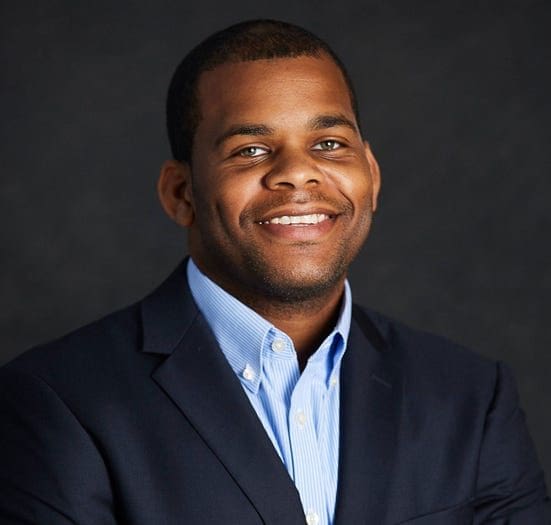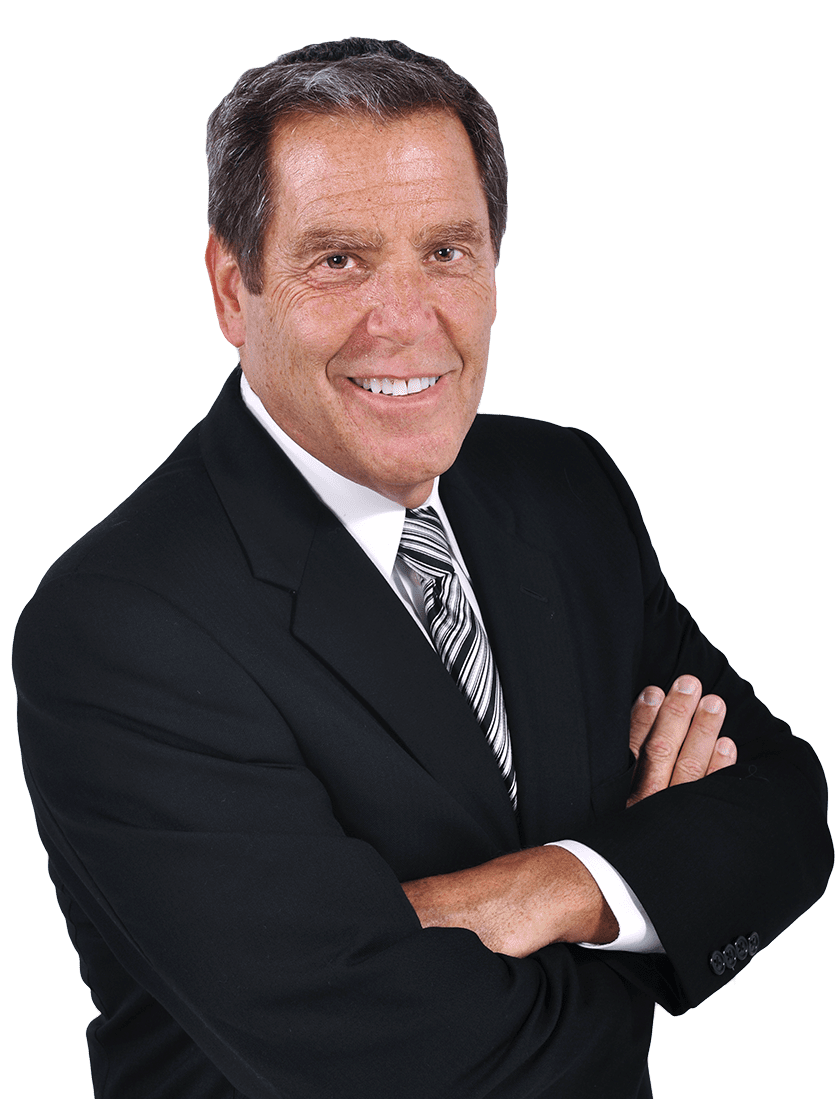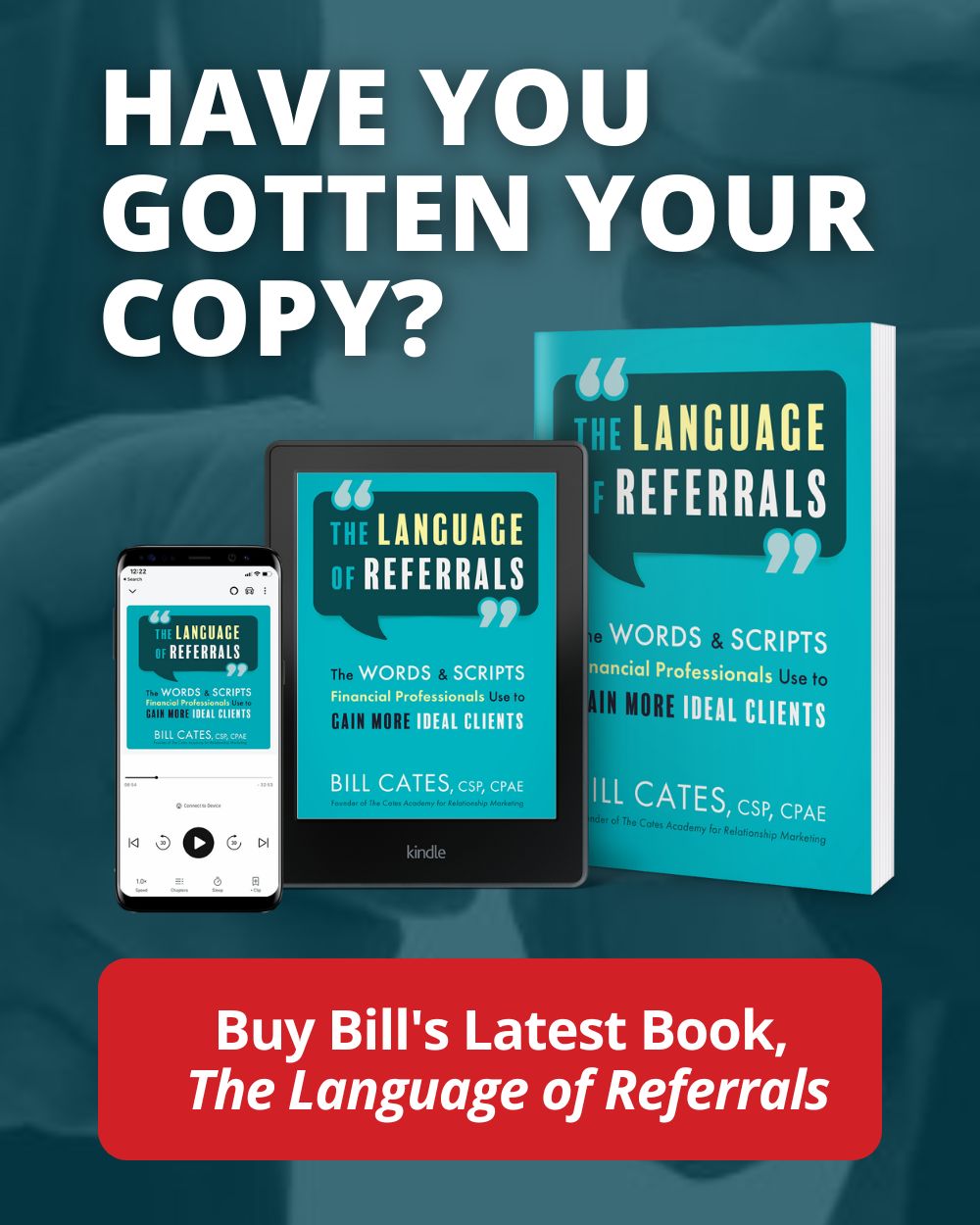Check Out Bill Cates’ NEW Top Advisor Podcast™
Interviews with Top Advisors for Top Advisors!
Top Advisor Podcast™
Ep. #9 – Attract More Ideal Clients Using Reputation Marketing with Malcolm Ethridge CFP®, CRPC®
The right mix of reputation marketing strategies, such as target marketing, hosting a podcast, and even getting paid to speak at events, all work together to bring more right-fit prospects into your business.
In this episode, Bill Cates is joined by Malcolm Ethridge CFP®, CRPC®, Executive Vice President and Financial Planner at CIC Wealth Management. Malcolm discusses how his reputation marketing efforts have changed his business dramatically over the last six months, including how he has continued to get qualified prospects contacting him because of the reputation he has created in a very specific target market.
Want More Top Advisor Podcast Episodes? CLICK HERE!
–
Malcolm discusses
- Why he chose to target the technology market––and what specific value he brings to clients
- How his reputation within the market benefits his business
- How much easier it is to get referrals by focusing on a narrow target market
- Two strategies which played a significant role in building his business reputation
Resources:
Connect With Bill Cates:
-
Show Transcript
Welcome to the Top Advisor Podcast brought to you by ProudMouth’s Influence Accelerator Academy. I’m your host Bill Cates. In each episode, I interview one of the financial service industries top performers to learn their secrets to sustain success. These short interviews we’ll get right to the heart of what each top advisor is doing to acquire more right fit clients.
You’ll be reminded, renewed, and inspired to take powerful action. You’ll impact more lives and increase your income at the same time. Now onto the show.
As you have learned through my other episodes, I focus my interviews with top advisors on one main topic. What’s the one thing that he or she is doing, that’s really working and worthy of our attention. Well, with today’s guests, I could focus on any number of strategies, such as target marketing, running a podcast, even getting paid to speak at events with a room full of prospects.
So since all of these strategies work together for him, I’ve chosen to put this episode under the umbrella of reputation marketing. So Malcolm Ethridge, welcome to Top Advisor Podcast.
MALCOLM: Thanks for having me Bill. I appreciate it.
BILL: Well, Malcolm, I was very impressed when I went to your website and you are referred to me, since I teach referrals, I want to get most of my guests through referrals. But there is so much I want to talk about. Before we get into that just give everyone listening, a sense of your business, you know, the scope, a glimpse into staff, where you’re headed. Just a little bit to give us context.
MALCOLM: Yeah, sure. So, the answer to this question has changed. Quite dramatically over the last six months or so.
And that might be a testament to what we’re about to talk about, but to start at the very beginning, I started at Merrill Lynch back in 2011. I was in their advisor training program. I graduated the training program and stayed around for another couple of years then got recruited away to Wells Fargo Advisors and stayed there for about three and a half years.
I am now at an RIA, which I joined back in May of 2019, called CIC Wealth Management. We’re right outside of DC. And so I have been in the business all in for about 10 years. In the last couple years, I got very serious about working with senior managers, executives, and some small business owners in tech-related professions. Which I’m sure we’ll talk more about in this as well. But as far as the team is concerned and what I was alluding to, I am now having to add a couple of pieces to the overall team. Because the client work as far as planning is concerned, is getting a little bit too heavy for myself and one assistant to work on.
So good problems to have, but definitely a problem we’re having to solve.
BILL: Well, you want to keep serving your clients well and you want to keep growing in the right direction, so it makes sense. You’re right a good problem.
Malcolm, there are a lot of markets one could choose. I’m curious why tech? What made you choose technology and who within technology give us a sense of the target market who you’re reaching out to and how you’re serving them, what value you’re bringing to this particular market?
MALCOLM: Yeah. So a business philosophy of mine personally is that it doesn’t make sense to go into business just for the sake of going into business. It doesn’t make sense to sell a product just for the sake of selling that product. Right? In my opinion, as the proprietor of the business, you should find something, that is a really big problem. A large total addressable market. But then separately decide on the thing that you yourself are uniquely qualified to solve. Right? Yes, it’s a problem. Yes, it’s a wide open ocean, but what about you makes you uniquely qualified to solve this problem? And so I am actually a failed computer engineer. I failed in the sense that I started out college as a computer engineering major, got two years into it, decided this was something I was going to have more of a hobby over the next 40 years and not make a career of it. But growing up, my entire life basically, even through high school, I did an advanced technology program.
I had an internship building cyber security software at university of Maryland while I was in high school. So like I have a bent toward technology, but I’m also like not a technologist. So I figured it gives me an opportunity to sort of satisfy that curiosity. I can stay up on what’s happening in the world of tech and I have a reason to be reading Tech Crunch and Fast Company and all these other things that are coming out in a way to apply that still makes it relevant to what I’m doing. So, in addition to that, the reason that working with folks in tech is a great opportunity is because there’s so many people who are getting paid in equity compensation as part of their total compensation package. And they’re not getting very much in the way of guidance as far as what to do with it. Employers do a great job of giving you education, but they don’t do a great job of giving you guidance. And so that’s where I saw an opportunity to step in and fill that void.
And then again, you know, I felt I was a little bit uniquely qualified in the sense that I speak nerd too, so I can help in a way that the average advisor’s just not going to get it.
BILL: A lot of advisors don’t like to get into that space do they, with the equities?
MALCOLM: Engineers are not usually most advisors ideal client because they ask so many questions.
BILL: They read everything don’t they?
MALCOLM: They read everything. They read the prospectus, they read the contract in full. They have 14 page detailed questions at the end of a meeting.
And most people are like, you know, I just don’t want to get into this. And so I actually like the nerdy details. I really liked the nuance and getting into, if I tweak this one eighth of a rotation, what does that do for the end product? Right? That is right up my alley. And so I just speak the same language as the people that I’m working with.
BILL: I’m just as an aside, I wonder, do you talk to them about engineering a great financial plan?
MALCOLM: No, but that’s a really good marketing tactic that I might work into some of the copy out of here.
BILL: Yeah. That’s two thirds of a pun. P. U.
MALCOLM: You’ll have to invoice me for that one.
BILL: Yeah. So, all right. So we know that because of this, it’s an underserved market.
And it’s a market that the people that go into quite often don’t know it as well as you do. Anyone going into the market generically is not going to serve it as well as you do. So they get a lot of value. In fact, these associations and firms hire you to come in and speak to their engineers or folks. And we’ll get to that in a minute, but how has this made a difference for your business?
Ultimately, what are the benefits to Malcolm and your firm for making this decision and creating this reputation within the market?
MALCOLM: It makes it easier when people ask the question, What do you do? Who do you do it for? How do you do it?
It becomes that much easier when the target audience is so narrow that I don’t have to worry about trying to be everything to everybody. Right. So where in a normal advisor world, someone asks, what do you do? And you say, “Oh, I’m a financial advisor. I help individuals, families, small business owners, charitable organizations, and NBA teams, with their most complex financial situations. And I act as sort of the hub to my client’s financial situation. I’m their financial quarterback.” There’s all these different things that these buzz words and phrases, you try and work into your elevator pitch to be as broad as possible and appeal to as many people as possible. And what ultimately ends up happening is you appeal to no one.
Because we all take the stance of trying to make ourselves more comprehensive than the last comprehensive financial planner this person spoke to. Or where were more specialized and more educated on X, Y, and Z than the other one that they spoke to. And then in reality, we’re trying to be so all-inclusive that we just can’t get to anyone.
BILL: Right.
MALCOLM: But by making it extremely specific, like in my podcast we keep referring to, it’s called the Tech Money Podcast. I can’t get any more specific than that, right. As far as who I am targeting folks in technology who have money, that’s it. And it makes it that much easier for me to have to explain what I do.
To answer a question you didn’t ask, but I know you will at some point, when people ask me, what do you do? I don’t even tell them I’m a financial planner anymore. I say I host a podcast on money and technology. That now is more interesting than, I’m a certified financial planner. I work with senior managers and executives in tech.” Any of that other kind of stuff that would have sounded great, that’s online somewhere and they can read it if they care. But me saying, I host a podcast on money and technology, they immediately say, Oh! Tell me more about that.
BILL: Absolutely without question in my coaching, Malcolm, the biggest difficulty that the folks I coach face and the work I do is helping them come up with something that doesn’t sound like everybody else and sounds a little different. And you’re right, the tendency for a lot of people is to expand the tent. Right. Let’s take in more people. Oh, we don’t want to leave out these folks. And we don’t to leave out these folks. The problem is your messaging gets so weak. You don’t attract anyone.
So that’s an important point. All right. Your messaging is easier. It’s more impactful. It’s clear. Any other benefits from targeting the market?
MALCOLM: Yeah, we sorta left out the WITFY approach that I’m sure you, as a sales coach, I’ve taught plenty of people.
What’s in it for you as the advisor? It makes it that much easier for you to know who you should be talking to, how you should be talking to them and what you should be talking to them about. Because if somebody asks me, what should I be doing as a cardiologist to get more understanding of X, Y, or Z. I have no idea. I don’t know any cardiologists. They’re not in my practice.
If you ask me, what should I do as a cyber security architect? I can tell you with no question. And I probably even know somebody in the top five companies in that wheelhouse. Right? So now my value to you as a prospective client has just gotten infinitely better and it makes my life easier as far as communicating what I want to get across. So for you as the advisor, though, what’s in it for me, it just simplifies your life too as the practitioner.
BILL: Have you found that by focusing on this target market, it’s easier to get referrals? Is it not? People know people like themselves. They like the fact that you’re focusing on people like themselves, they see what’s going on in the company in terms of people bringing in layoffs, changes in benefits package. It would seem that would be much easier to get referrals. Have you found that?
MALCOLM: I have found two things. One it’s easier to get referrals when people know how to refer you, right? You’re the stock options guy or people will say Malcolm’s the stock options guy talk to him. Or Malcolm’s the stock options guy he’s got a podcast episode on this listen to it. Either of those is fine by me because eventually they make their way through the funnel.
And if they fall through to my inbox, it’s because they’re ready. That to me is the best outcome of narrowing down your niche. But then also once you learn your way into a company, the referrals are sort of automatic in the sense that I can now tell you something that you didn’t know you even needed to ask the question about.
I can answer a question you didn’t even know you needed to ask and it makes it that much easier for me to then create that opportunity.
BILL: Well, and then that person’s going to say, you know what I just learned from my financial guy.
MALCOLM: Precisely.
BILL: Now in a minute, I want to talk to you about two strategies that played a significant role in building reputation and target market, that is hosting your own podcast.
You’ve obviously talked about that. I want to go into a little more depth on that because I know some advisors are considering doing a podcast or they see other advisors doing it. They wonder, should I do this? And then the other one, which is pretty cool is getting paid. to speak at events. Getting hired, not just invited, but invited with money associated to it, not just your expenses, but a fee.
So to be in front of a room full of prospects. But first let’s hear a quick word from the sponsor of Top Advisor Podcast.
SPONSOR MESSAGE: This podcast is sponsored by ProudMouth, the influence accelerators. If you’re like our clients, you want to spend more time educating people and less time selling. That’s why we turn main street experts like you into trusted mainstream authorities.
We help you amplify your influence over a growing audience of magnetically attracted fans who will chase you down instead. Visit ProudMouth.com to learn more.
BILL: My guest with me today is Malcolm Etheridge. Malcolm, more and more financial advisors seem to be starting their own podcasts. They ask me, should I start a podcast? Tell us a little bit about The Tech Money Podcast. And by the way, you said, can you make it more specific than the tech money podcast?
Yeah. You could make it the tech people with a lot of money podcast that would be more expensive anyway, you know what made you just start the podcast. We know why you picked the market. But why the podcast per say and how’s that working? And then how’d you make it work for yourself?
MALCOLM: So to your point about a lot of money, we have in this business, a very narrow subset of people who we are interested in talking to and working with. In reality, it’s probably 10% of America who has half a million dollars or more in assets to reach the minimum to work with somebody like myself. There’s firms that have million dollar minimums, $10 million minimums, whatever it is.
And so one of the things that I don’t really like having to do, is telling people you can’t afford to work with me. And I know that’s not necessarily the way we say it, but inherently that’s what we’re saying by creating that minimum target, we’re saying you can’t afford my services. One way that I felt like I would have the ability to help as many people as possible or as many people want access to this information without having to also be super elitist and turn a ton of them away, is to give away most of the information for free. So they don’t have to hire me to get access to my brain. They can just go listen to all of the different podcast episodes that I’ve done.
They can go read my blog. I’ve put out 25 different blog posts since last year on these various financial topics and I intend to continue doing it for a few years. They can go consume all this information and do it themselves, make no mistake about it. But if they decide to take it a step further and hire me, they’re welcome to do that too, obviously.
But I felt like the podcast would give me the ability to just help as many people as I can as possible and bring as many people into the tent that otherwise wouldn’t get access to quality financial information, not a sales pitch wrapped in a financial product.
BILL: How do you promote the podcast to your perspective clients? What’s the vehicle for getting these folks who aren’t your clients yet to know about it?
MALCOLM: Yeah, so I am good at knowing what I’m not good at. And I have hired a team, ProudMouth, to record, edit and distribute the podcast for me so it gets published every other Wednesday is our cadence.
The team at ProudMouth actually publishes the episodes online. And then they syndicated to all the different places, Apple podcast, Spotify, SoundCloud, Stitcher, etc. And that’s one place that it goes. I also have a newsletter that I do each day that a new podcast episode gets released and says, “Hey, everybody listen to episode five. It’s about estate planning.” And that goes out to my email list. And then I also have a pretty decent amount of connections on LinkedIn, I think like 4,000 at this point. And so every time a new podcast episode gets released, it goes to LinkedIn. That then becomes a source of people finding out about it.
I also have a decent amount of Twitter followers. And so a new podcast episode comes out, it gets released on Twitter as well. And so all of these different places by the end of the day are all going to be getting at least one announcement about that new episode and the reminder that you need to go and listen, and then, oh, by the way, if you’ve already subscribed to it, it automatically downloads into your podcast listener anyway and you’re going to get it one way, right?
BILL: And have you actually acquired new clients just from someone listening to the podcast?
MALCOLM: I don’t know directly that I’ve had anybody who has listened to the podcast and that was their first way into the Malcolm ecosystem. But I have had already this year, three instances where I met with a prospective client, I asked them what brought you to me, how you guys find out about me.
And they told me that in their research process, they listened to one of my podcast episodes and they all use this phrase; “We felt like we already knew you.” Because I’ll say like tech people, again, they really love data. Right? And so they’ll go interview 5, 6, 10 different financial planners before deciding on who they want to work with.
And so I’ll always say, I know you have your spreadsheet that you created to decide who was going to make the cut and you ultimately decided to hire me. Right. What made you ultimately decide that I was your guy? And each time they say I listened to your podcast episode on X. And at that point, I felt like I already knew you.
BILL: Yeah, that’s a great question. Important question to ask. I just talked to a guy yesterday who I will be interviewing for this podcast down the road, who does get a lot of new clients from his podcast. He’s been doing it a lot longer than you have. The people that contact him that want to do business with him, he says they can finish his sentences. Because they’ve heard what he says in the way he talks and what he thinks enough, like you said, they know you, right? That’s beautiful.
MALCOLM: I’m looking forward to getting there. I’m only on episode 13. I think we recorded like 20, but I’m looking forward to getting there.
BILL: And it’s already helping you. And you’re having a good time and all the good stuff, it’s already monetizing itself and it’ll just get better. So, let’s shift to another question and that is this speaking at events. You don’t just get paid in honorarium. They don’t just say, okay, Malcolm, you’re an expert in our area come and we’ll cover your expenses. They actually pay you a speaking fee. And you’re in a room full of prospects. Correct? Tell us a little bit about that and how that came about.
MALCOLM: Yeah. So in addition to the speaking fee, to your point, if I’m having to travel a hundred miles outside of DC, that means I’ve got to stay overnight and they’re paying the Malcolm needs a hotel room fee too or whatever.
Yes, it’s great to be able to show up and buy a booth at the event as an example. Right. And people can self-select when they come out to the meeting general space, or God forbid, they throw everybody in like a vendor room. Right. And you’re at the mercy of whoever decides to walk up and give you 30 seconds.
But the real trick is getting to be the person on the stage that everybody is focusing on. And from that point, you become the authority on that topic. And now everybody’s rushing to talk to you before you run off to do the other things that you have to do today, because now you’re so important that I know you must have 10 other things you’ve got to do today.
And so I’ve got to hurry up and talk to you and get my problem to you and schedule an appointment to meet, to follow up with you because you’ve got to go. That’s the transition that happens once your other person on the stage giving the address. And so, I’ve had actually surprisingly a number of virtual speaking engagements through COVID that I can do from my house.
And surprisingly people are willing to pay full freight to have me show up electronically or digitally or virtually. However you say it. Rather than me having to fly out somewhere, show up at the conference and physically be in place to present, they’re willing to pay the same $8,000 speaking fee to have me do it virtually, which has been amazing to me because now I don’t think I’ll ever want to go back to doing it in person.
BILL: I think you’ll have to see because when you’re doing it in person and you can connect with people, you’re connecting with people in a way that might make it easier for them to hire you as their advisor and virtually a little less easy.
Maybe, I’m guessing, maybe I’m wrong. Maybe there’s no difference at all.
MALCOLM: That’s fair. We’ll see. I don’t know. But I do know what happened so far with the virtual events though, is that I make it as educational as possible. I do not make it about me. I don’t sell anything and actually start off by saying I have nothing to sell you guys.
I have no products here to try and push. There’s no hard sell or soft sale that’s going to show up toward the end of this thing that you’ve got to stay on guard for. I’m already taken care of, I’m here and I’m good. And that allows people to get comfortable and not have to worry.
But then on the flip side of that, what I’ve seen is I’ll have like 10, 12, 15 people who will all of a sudden subscribe to my newsletter list, to my mailing list. Right? And that’s where the rub is, it’s those people coming into the funnel after being a part of one of these sessions that I spoke at, and then deciding that, I want to get more from that person.
So now they go listen to five podcast episodes or whatever, and then they make their way into my inbox by scheduling a meeting with me on my website. And I’ve never spoken to them directly at any point in there, but it’s all working on its own before I have to.
BILL: I know how that works. I’ve had people come to me. They have been getting my newsletter for years, or I’ve heard your, this and that years ago and I’m finally in a position. So, there’s a lot of things you do and they all compliment and talk to each other to conspire to allow you to help them and to bring them into your world.
So, I have one more question for you, but first I understand you have a question for me.
MALCOLM: Yeah. I’m excited about this. I was told I get to ask the host a question, which, you know, almost never happens. It doesn’t happen on my show. So the question that I have for you, you’re the referrals guy, right? You’re the guy that wrote the, I would say The Book, but that would be an understatement. Right?
So the question I’ve got for you related to referrals, but it’s more about quality of referrals.
I get a number of clients that say, “I’m so enthused about the job that Malcolm and his team have done. I really want to introduce them to X person.” It’s usually a colleague too.
But one of the challenges that I have is as you know, when one of your better clients sends you a referral to someone they know and love, the last thing you want to say is that person isn’t a good fit for me or for my practice or for my firm, or however you want to say it.
BILL: Right.
MALCOLM: But that doesn’t mean it’s not true.
So is there a classier way to be able to say to clients, I really appreciate you referring me to your three colleagues that have told you that they needed a financial planner themselves. But here’s the type of profile. Here’s the person who I think would be a really good fit. And maybe here’s the profile of a person who might not be such a good fit.
BILL: You asked for a classy response and you’re asking Bill Cates. So I don’t know, that’s kind of a, one of those oxymorons, you know, like military intelligence. So I believe you’re right in only accepting the people that are right for you because that’s what’s right for them.
Right? If you, if we always think in terms of what’s right for the client, what’s right for the prospect, we’ll always make the right decision. And if they’re not right for you and your business and what you like to do, and the processes you have set up and all those various things, then you’re not the right advisor for them.
Right. So they need to go with someone who’s jumping up at that excited and has all the tools and the perspective they need. Right? So there’s a few lines of defense here, the first one is educating your clients. Teaching them who you serve the best. And it’s a way to plant the seed for referrals without really asking.
It’s like, you know, “Malcolm, many of my clients like to introduce me to other folks that they care about. And I love that. I’m never too busy to see if I can be a resource for other folks. And my practice is geared towards certain types of folks who have done certain things in their life. So not everyone’s a perfect match and it’s important that everyone works with the right advisor for them. So, what I’d like to do is just share with you a little bit of those parameters of demographics, psychographics, if you will, and then you’ll have a sense. I don’t expect you to know their specific situation, but you’ll have a sense. And truth is, it’s people like yourself.”
And so that’s one way, right? So we’re educating them. You can also say. “So if you do send someone my way and feel free to send anyone, even if you’re not sure, I’m never too busy to see.” And those are the magic words, right? To see if I can help anyone. And if they’re right, if I believe I’m the right advisor for them and I can do a great job for them, I’ll probably let them know that. If I’m not the right advisor for them and they wouldn’t be best served working with me, I’ll let them know that too, because they need to do what’s best for them. Then they go, Okay. So now that’s kind of the first line of defense, is that education. Certainly in the work you do with the podcast and the speaking, and some of the other things in how you write your blogs, you can choose language and can choose stories and examples and ways to talk about what you do that plants that seed. Since my practice is geared, mostly towards people with XXX, I do this, this, and this right. Those of you with less might want to do it this way. So you can infuse that everywhere.
So now let’s say it’s happened. Someone’s contacted you or a client thought of someone. Well, if you’re in a meeting with someone, I would say, all right, let’s talk about your friend, George. Let’s talk about your sister, Laura. Let’s see if it makes sense. I know I’m not the right advisor for everybody.
And so you get a feel. Now, if it’s close family members, you may do it anyway. Cause it’s part of the household. We all know that, but outside of that, we don’t. And then if someone calls in, zooms in. We want to qualify and we can do it by asking them some questions and telling a little bit about what we do and just saying, let’s learn a little bit about each other and his first phone call and see if it makes sense to continue the conversation. And in that you talk about assets, you talk about income, you talk about whatever you need to talk about to send that signal, here’s who we serve the best. And not in an arrogant way, of course. And they will self-qualify themselves out if they’re not, and it’s usually pretty easy. You’ve built some ways to help them, which is great. I think personally. And I think most advisors, agents should have other relationships with others who they can feed with the folks that are right for them.
Now, the last item on this, immediately hang up the phone, close out the zoom. Call your referral source. You probably won’t get them. You’ll probably get a voicemail and just say, “Hey, I just talked to your friend, George. We had a great conversation. The timing isn’t right for us to be working together right now. But I do appreciate the trust you have in me and the work I do. And I look forward to the next opportunity.”
You’re not revealing any proprietary information that would not be appropriate. The timing isn’t right. And that’s the truth. And now later, a subsequent meeting/ review meeting, six months later, you could have that educational conversation about who you do serve the best. But I wouldn’t do it, on the heels of their friend not working out with you.
So hope that helps a little bit.
MALCOLM: Yeah, I like it. Especially the phone call to say thanks, but it’s also let them know before that person gets to them and say, Hey, I met with that Malcolm guy and he was a jerk.
BILL: Well, I know you’re not a jerk. And they probably won’t say that, but they may say, “Well, I guess I didn’t have enough money. I didn’t realize you miss money bags.” There could be an attitude. And so, if they’ve heard from you first, then they’ll discount that attitude. They won’t be wondering what the heck did Malcolm say to this person right? Now they know. And quite often we know if our friends can be jerks in different situations. So they heard from us. It’s good. You can talk about it later if you want, but without revealing anything inappropriate.
The last question I have for you, Malcolm is, what’s one thing, maybe two things that you’ve learned over the last year or so, about the industry and or about yourself? How has Malcolm Ethridge grown over the last year or so?
MALCOLM: Well, one thing I will say that I’ve learned through the pandemic about our business is that people have become more willing or they have shown themselves to have already been more willing to work across geographical borders. I am in DC. My office is in Maryland. Between Maryland, DC and probably Northern Virginia, I would say before at least 60 ish percent of all of the clients that I personally work with are from there. Not necessarily all the clients of the firm, but that represents a pretty healthy slice of all of the clients that I’ve worked with. However, in the last year, I’ve probably onboarded myself somewhere around 16ish clients. And I’d say less than half of them are in DC, Maryland, or Northern Virginia. They’re also people who I’ve never met with in person, obviously cause COVID, and so they’re all virtual relationships. I’m still able to have maybe not the same level of quality and connection that you have with people sitting across the table from you, but they’re still willing to engage in the same ways that they do when they’re in your conference room.
So that’s one. It’s really like, we always have concern that if I’m not there physically in front of the client to give them the information and to let them know how smart I am, then they’re going to want to work with somebody else because they’ll want that in-person connection. So I think that’s one that stays, frankly, in a lot of cases.
But the other one to your point is just how much all of these things that I’m doing work in concert to get to that same place. Like I’m speaking and in the middle of speaking, I get a chance to pub the podcast and on the podcast, I get a chance to pub the planning practice and then talking to someone while I’m doing financial planning, they happen to be connected to the person who is in HR and is in charge of inviting people to come in and present to their employee resource groups. And so it all creates like this symbiotic circle that every one little incremental thing that I throw into the marketing channel helps just that much more to get something going that ultimately feeds on top of itself. And kind of to the point you were making, when we started this thing, it’s created a bit of a capacity issue on my end to the point where I’m even having to tell people I have a waiting list out to August. You’ve got to wait a month or so before I can even have a qualifying discovery meeting with you to know if you’re going to be a good fit.
So all that to say, if any advisors are listening to this that are interested in working with science and technology, let me know and let’s have a conversation. Cause you know, I’ve gotta do something.
BILL: All right. And that my friends is the difference, up until the last plug at least, the difference between marketing and prospecting. Prospecting probably always stays in our business in some form or another, but Malcolm is doing a lot of marketing and drawing people to him. So Malcolm Ethridge, from my hometown area, the DC area.
Thanks again for being on the Top Advisor Podcast.
MALCOLM: Thanks for having me.
BILL: Thank you for listening to the Top Advisor Podcast brought to you by ProudMouth’s Influence Accelerator Academy. Click the subscribe button below to be notified when new episodes become available. Visit my website, ReferralCoach.com for links to my books, courses, and online tools and to register for the Cates Academy.
About Our Guest

Malcolm Ethridge is a Certified Financial Planner™, speaker, blogger, and self-proclaimed personal finance nerd. His areas of expertise include retirement planning, investment portfolio development, tax planning, insurance, stock options and other executive benefits. He leverages that expertise to help senior managers and small business owners in tech make sense of some of the most complex financial situations that working professionals tend to face.
Connect With Malcolm:
![]()
Never Miss an Episode!
Click below to subscribe on your favorite podcasting platform.
P.S. Don’t keep Top Advisor Podcast a secret … share with a friend or colleague!
Click Here to Subscribe Tell a Friend

About Your Host
Bill Cates, CSP, CPAE, works with established financial advisors to speed up their growth without increasing their marketing budget. Advisors tap into Bill’s proven process to multiply their best clients through introductions from advocates and Centers of Influence (such as CPAs and attorneys), communicate their value proposition more effectively, and create a reputation in a profitable target market. Bill helps advisors move from push prospecting to magnetic marketing – to attract more Right Fit Clients™.
Bill is the author of four best-selling books, Get More Referrals Now, Don’t Keep Me a Secret, Beyond Referrals, and Radical Relevance. Bill is a highly sought-after international speaker and coach, as well as the founder of The Cates Academy for Relationship Marketing™.
Do you know someone Bill should interview (including yourself)?
Do you have a topic you’d like to see covered?
Contact Bill Cates directly: BillCates@ReferralCoach.com







